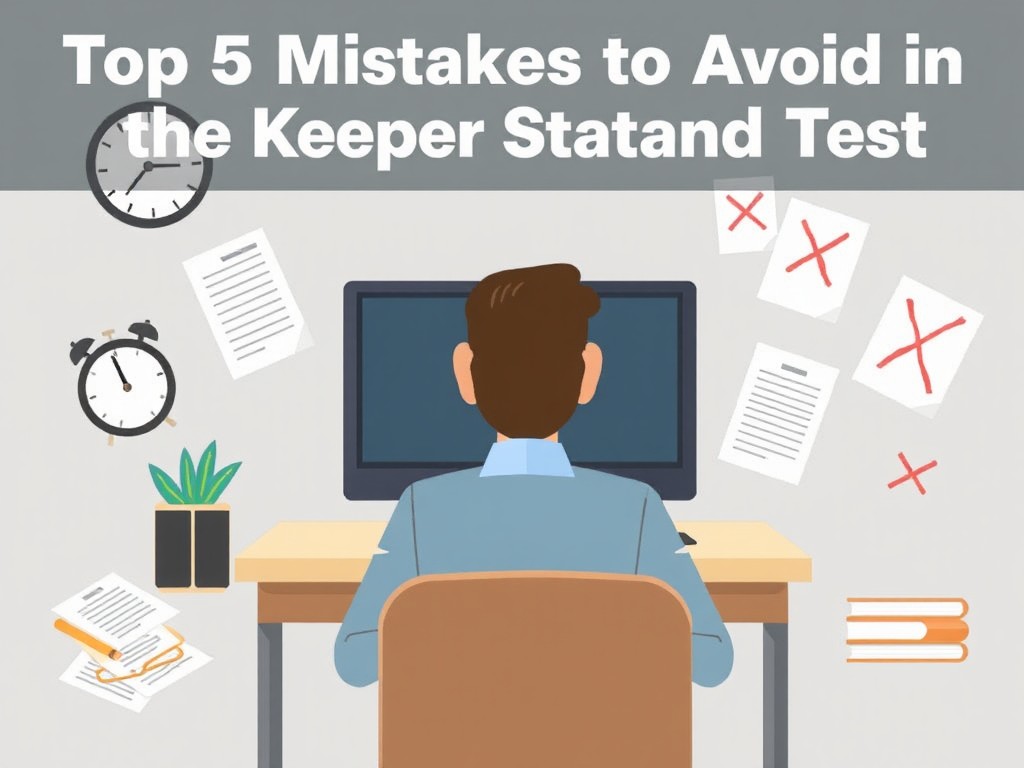Top 5 Mistakes to Avoid in the Keeper Standard Test
The Keeper Standard Test is an essential evaluation designed to measure specific competencies in a given field. Whether it is in a professional context or within a specific certification program, this test is a critical benchmark for many individuals. Preparing for it effectively can make the difference between success and failure. Unfortunately, many test-takers make mistakes that can significantly affect their performance. In this article, we will explore the top 5 mistakes to avoid in the Keeper Standard Test, helping you maximize your chances of success.
1. Failing to Understand the Format of the Keeper Standard Test
One of the most common mistakes candidates make is failing to fully understand the format of the Keeper Standard Test. While this might seem like a small detail, it can drastically affect your performance. Each test has a unique structure, whether it includes multiple-choice questions, essay questions, or practical assessments. Understanding how the questions are framed, the time limits for each section, and the weight of each question in the overall scoring can be crucial to success.
Why this matters: If you are unfamiliar with the test’s structure, you may find yourself mismanaging time, skipping questions that are heavily weighted, or misunderstanding the requirements of each section. For instance, some sections may test your theoretical knowledge, while others may demand practical application. Approaching the test blindly is a recipe for failure.
Solution: The best way to avoid this mistake is to research the format thoroughly. Look for practice tests, guidelines provided by the testing body, or speak to individuals who have taken the test previously. Understanding the layout of the Keeper Standard Test ahead of time will reduce surprises on the test day, allowing you to focus purely on delivering your best answers.
2. Inadequate Preparation and Study Techniques
Another frequent mistake made by candidates is inadequate preparation. The Keeper Standard Test requires not only content knowledge but also familiarity with the specific skills being evaluated. Relying on general knowledge or prior experience without targeted study can lead to gaps in your understanding, which may result in a poor score.
Common problems include:
- Cramming at the last minute, which leads to superficial learning and high stress.
- Focusing on the wrong topics, often ignoring the test’s key areas of assessment.
- Not practicing enough with mock tests or question simulations that mirror the Keeper Standard Test.
Why this matters: The Keeper Standard Test often covers a wide array of topics. Without a well-rounded study plan, you might neglect areas that could significantly affect your overall score. Moreover, inadequate preparation can cause undue stress, and during the test, anxiety can lead to further mistakes.
Solution: To avoid this pitfall, it’s essential to start preparing well in advance of the test date. Break down the content into manageable study sessions, focusing on key areas highlighted in the test’s guidelines. Supplement your study with practice tests, which will not only help you become familiar with the test format but also improve your ability to manage time effectively. Remember that studying consistently over time yields far better results than last-minute cramming.
3. Poor Time Management During the Test
Time management is a crucial aspect of any standardized test, and the Keeper Standard Test is no exception. Many candidates make the mistake of spending too much time on difficult questions, leaving little time for easier questions they could quickly answer. This often results in leaving questions unanswered or rushing through the final sections of the test, both of which can negatively impact your score.
Why this matters: Poor time management can lead to a situation where you are unable to complete the test within the allocated time. The pressure of the ticking clock may cause you to rush, leading to careless mistakes and incomplete answers. Furthermore, spending too much time on certain sections can rob you of the opportunity to earn easy points in other areas.
Solution: A proven strategy to avoid poor time management is to practice timed tests in the lead-up to the actual Keeper Standard Test. Familiarize yourself with the types of questions and practice identifying which questions you can answer quickly and which will take more time. On test day, if you encounter a challenging question, it’s often better to move on and return to it later if time permits. Allocate time for each section based on its importance and the complexity of the questions. The goal is to ensure you answer as many questions as possible within the time limit.
4. Neglecting Practical Skills and Focus on Theoretical Knowledge
Many candidates focus heavily on studying theoretical knowledge while neglecting the practical skills assessed in the Keeper Standard Test. In some cases, the test may be designed to evaluate how well candidates apply their knowledge in real-world situations, rather than just testing rote memorization. Focusing only on theoretical concepts without practical application could leave you unprepared for significant portions of the exam.
Why this matters: If the test includes a practical component, being unprepared for it can be disastrous. Even if you excel in theoretical sections, failing to demonstrate your ability to apply that knowledge in practical scenarios can severely affect your overall performance. Moreover, practical skills often carry a significant weight in the final score, making them essential for passing.
Solution: To avoid this mistake, you should integrate practical exercises into your study routine. If the Keeper Standard Test requires hands-on application of skills, practice those skills regularly. For instance, if the test evaluates your ability to solve problems under specific constraints, simulate those conditions as part of your preparation. Similarly, working through case studies or situational problems can help improve your practical thinking, ensuring you are well-prepared for both theory and practice on test day.
5. Underestimating the Importance of Mental and Physical Readiness
Another significant but often overlooked mistake is neglecting mental and physical readiness for the Keeper Standard Test. Many candidates focus entirely on their study plans but forget that peak performance also requires a healthy mind and body. Without adequate sleep, proper nutrition, and mental clarity, your performance on test day can suffer.
Why this matters: Test fatigue is real. On the day of the test, mental exhaustion can cause slower thinking, decreased concentration, and an increased likelihood of making careless mistakes. Likewise, poor physical preparation, such as skipping meals or not staying hydrated, can contribute to fatigue and loss of focus, especially during longer testing sessions.
Solution: Preparing for the Keeper Standard Test should include self-care strategies. Ensure that you are getting enough sleep in the weeks leading up to the test. On the day of the test, eat a balanced meal and stay hydrated to ensure you are physically ready for the challenge. Incorporate relaxation techniques, such as deep breathing or meditation, into your routine to help manage anxiety and improve mental clarity. By prioritizing both your mental and physical well-being, you can enter the test feeling calm, focused, and prepared.
How to Overcome Common Keeper Standard Test Challenges
Despite careful preparation, many candidates still face challenges during the Keeper Standard Test. It’s important to recognize that unexpected difficulties can arise, but being adaptable and remaining calm under pressure is key. Below are a few additional strategies to help overcome common challenges during the test:
- Manage stress effectively: Techniques such as controlled breathing, visualization, or short mental breaks can help manage stress during the test.
- Use the process of elimination: When faced with a difficult question, eliminate clearly wrong answers to increase your chances of selecting the correct one.
- Double-check answers if time permits: Once you’ve completed the test, review your answers carefully, especially in sections where you felt uncertain.
Conclusion: Mastering the Keeper Standard Test
The Keeper Standard Test is an important evaluation, and avoiding common mistakes is key to achieving a high score. By understanding the format of the test, preparing with effective study techniques, managing your time wisely, balancing theoretical knowledge with practical skills, and ensuring your mental and physical readiness, you can set yourself up for success.
Remember, thorough preparation is your best defense against errors, and being aware of these common mistakes gives you a distinct advantage. Approach the test with confidence, armed with the knowledge and strategies outlined here, and you will be well on your way to passing the Keeper Standard Test with flying colors.
Read Also Our This Post: How Texas Tech Baseball is Shaping the Future of College Sports

Kamran Khatri is a versatile writer and editor at ExpressZone.co.uk, bringing fresh perspectives and insightful commentary across a wide range of topics. With a passion for exploring diverse subjects—from technology, business, and finance to lifestyle, travel, and the arts—Kamran aims to inform, inspire, and engage readers through well-researched articles and thought-provoking content.
His work spans multiple categories including health, education, pets, entertainment, real estate, and sustainability, reflecting his commitment to delivering knowledge that connects with everyday life. Whether breaking down the latest trends, sharing practical tips, or highlighting cultural insights, Kamran’s writing combines clarity with creativity.
When he’s not crafting stories for ExpressZone.co.uk, Kamran enjoys keeping up with global developments, exploring innovative ideas, and connecting with readers who share his curiosity about the world.





